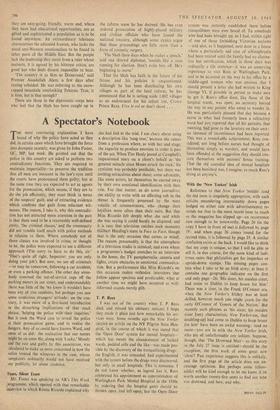With the 'New Yorker' Irish Reference to that New Yorker
'middle' (and the old term is singularly appropriate, with such articles meandering interminably down pages hedged on either side with advertisements) re- minds me that in the most recent issue to reach us the magazine has slipped up—an occurrence rare enough to be noteworthy. Page 26 (in the copy I have in front of me) is followed by page 19: and when page 26 comes round for the second time, it is followed by page 35. A similar confusion exists at the back. I would like to think that my copy is unique, so that I will be able to sell it, in due course, for the same kind of ludi- crous sums that philatelists get for imperfect or upside-down stamps. The missing pages con- tain what I take to be an Irish story; at least it contains one geographic indicator on the first and only page-26; 'His sister, his maiden sister, had come to Dublin to keep house for him.' There was a time, in the Frank O'Connor era, when the New Yorker's Irishry was at least skilled, however much yciu might yearn for the early O'Connor of 'Guests of the Nation.' But recently such phrases as 'his sister, his maiden sister [very characteristic New Yorker-ese, that doubling-up] had come to Dublin to keep house for him' have been an awful warning: read no more—you are in with the New Yorker Irish, who are of unfathomable coy tedium. Suppose, though, that 'The Drowned Man'—as this story in the July 27 issue is entitled—should be the exception; the first work of some great new talent? Past experience suggests this is unlikely, and the first page of the article does not en- courage optimism. But perhaps some fellow- addict will be kind enough to let me know if its worth another. twenty-five cents to find out who was drowned, and how, and why.
BRIAN INGLIS






























 Previous page
Previous page